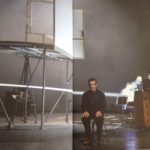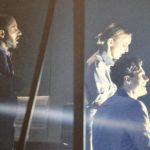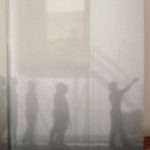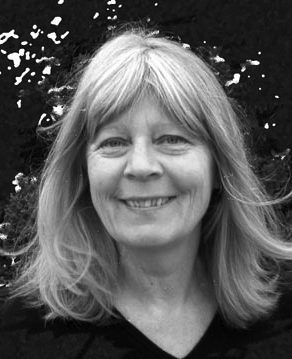September was the warmest month in decades in Berlin — at times too hot to do anything but escape to a museum, a movie theater (only the big ones have AC) or to see a play — and that’s what I did. Let me start with an intriguing production of Max Frisch‘s Der Mensch erscheint im Holozän that opened the fall season at Deutsches Theater. Herr Geiser, (Ulrich Matthes), sits center stage, silent, turning his back to the audience while watching a man play one piano after another scattered around the stage; then he looks at a group of tourists and their guide passing by him; then he turns to a small chorus singing Italien folksongs. He tries to say something but is cut short when he opens his mouth. Eventually he turns his chair around and starts talking to the audience in single words, short sentences, disconnected phrases. We find out that a storm has cut his village off from the world, a bigger one will come. Things around him are declining, even scientific facts and encyclopedic knowledge, something reliable he has pinned on the walls in his house to hinder the decline, but he knows that in the end it will also vanish. Herr Geiser is 74, retired, alone; knowledge calms his mind, he says but he knows that everything will go to pieces,”kaputt”. There is hardly any plot line, no suspenseful action in this quiet, intriguing contemplation about time, aging and the end of all things. Director Thom Lutz has created a wonderful, dream-like atmosphere that will still resonate long after Herr Geiser and his damaged world have disappeared behind many layers of fog-like gauze.
Toni Erdmann, the film everybody has been talking about since it premiered at Cannes to critical acclaim. I saw it in Kreuzberg, in a theater full of young people ready to watch the almost three hour long film on a late Monday night. The audience laughed their heart out — I did not. Not my kind of humor, although humor, they say, has a lot to do with culture, with language and class and perhaps with age, and that’s where I differ most obviously from Maren Ade, the director, who is my daughters age. Actress Sandra Hüller is fabulous as a young career woman who has lost almost all connections to her father but is willing to give it a try when he visits her at her work place in Bukarest, first dressed in his usual outfit of shirt and jeans carrying a canvas bag over his shoulder, then, after his attempts to connect with her fail, he returns in suit, wig and false teeth. He likes to dress up, it’s part of his job, we know from the first scenes of the film, and in costume he seems to trigger not just laughter in the audience but also some sort of reconciliation with his daughter. It’s the only way he can approach her who is wearing her own costume, a tight business suit, that she eventually needs to shed in order to find some common ground with her father. It does not last. A long close-up shot of the daughter’s troubled, anguished face at the very end of the film does not predict change. Unfortunately, for me the joke with the false big teeth and the wig wore out after 15 minutes, and the ice cold glass and steel business world of the career daughter became repetitive. There is a birthday party full of surprises, a turning point, that makes sense. Not so funny, however, is the encounter between Toni Erdmann and a poor Bulgarian family that tries to find humor in juxtaposing the poor but happy people with the well-to-do but unhappy Germans — more deceiving and awkward than funny. The film has a huge following, especially in France, where Ade’s previous films, Der Wald vor lauter Bäumen and Alle Anderen were more popular than in Germany. (Shown at MVFF, Oct 2016, and in release in 2017)
Vor der Morgenröte, a film about Stefan Zweig’s last years in exile, is directed by actress turned filmmaker Maria Schrader in collaboration with Jan Schomburg (director of Über uns das All, – also starring Sandra Hüller – shown at German Gems 2012). Stefan Zweig, one of the most popular writers in the 1920s and 30s, has been accused by fellow writers that at the height of his career when his books were still in wide circulation in Nazi Germany he did not speak out against the Nazis. Was he a coward? Did he not want to spoil his successes? When Zweig left for Brazil he had helped many Jewish writers to emigrate and by 1940 when he himself had been added to the long list of forbidden books, he had not suffered persecution. Still celebrated in the Americas he had settled in a small town in the jungle of Brazil, lived a relatively comfortable life with his young wife – his former secretary – writing his autobiography Die Welt von gestern, attending receptions in his honor, socializing with emigrants living in the neighborhood, and then, without warning, took his life and that of his wife. The film unravels the last years of his life with all its contradictions – a frail, tormented writer, deeply connected to and longing for a peaceful Europe without borders choses his exile to be in the jungle of Brazil; a writer who refuses to say what the world wants to hear from him; a man, surrounded by admirers begging for help, and by devoted women who make his life comfortable. The great Josef Hader portrays the many layers of Zweig by just blinking an eye or moving a corner of his mouth to indicate that the three-piece suit he wears daily, hides a troubled soul. In six episodes, taking place between 1936 and 1942, the film creates an intense, historically anchored and beautifully shot, sequence of Zweig’s last years that do not try to answer the question: Why did he commit suicide. To shine more light on what tormented him we need to read his works, especially Die Welt von gestern. (Shown at Berlin & Beyond in Feb 2017)
Fukushima, Mon Amour, Doris Doerrie‘s latest film, I saw on my way back to the US on Air Berlin and then again at the Castro – what a difference! The wonderful beginning–clowns trying to add lightness and laughter to an aged community left behind in Fukushima after the disaster — framed the screening at Berlin & Beyond when San Francisco’s own Moshe Cohen came up on the stage of the Castro Theatre after the screening. He didn’t perform his clown acts – alas – but talked about how they had changed many people’s hard lives. I wish the film had focused more on that and less on the story of the young German woman who could no longer do the clown acts because of her own troubled past. She decides to help an older Japanese woman to clean up her house in the middle of the disaster zone where the geiger counter constantly pushes beyond the limits. How can you even think of living in the middle of high toxic waste? The film might be seen as a fairy tale: an old woman trying to rebuild her past – a home and her life as a geisha – not in the deep woods threatened by wild creatures but on a wide plane poisoned by nuclear waste. She finds unexpected support from afar, a young woman from Germany. Both need to come to terms with traumatic experiences. Haunted by the spirits of the past that show up at night in the ghost-like landscape they eventually, with each other’s help and that of good friends, find closure and a new beginning. Filmed beautifully in black and white on location in Fukushima. (Shown at MVFF, Oct 2016, and Berlin & Beyond Feb 2017)







